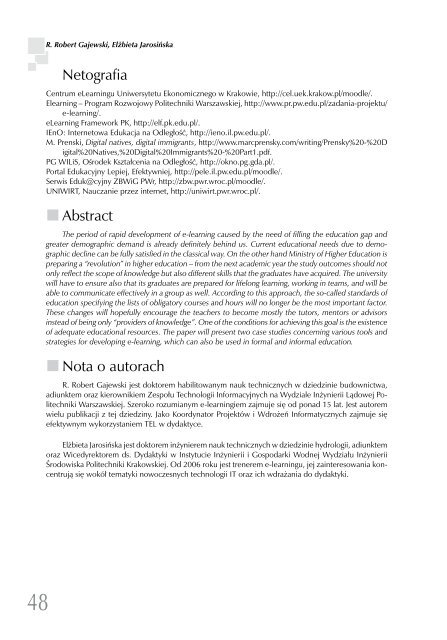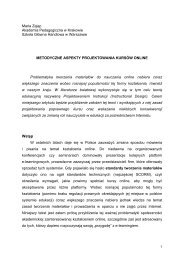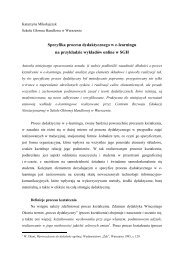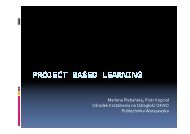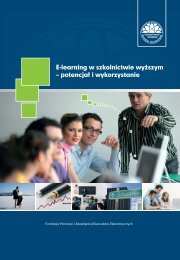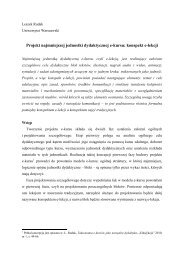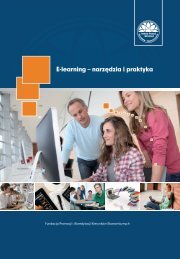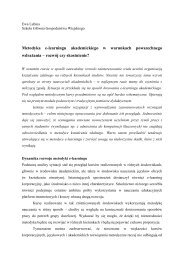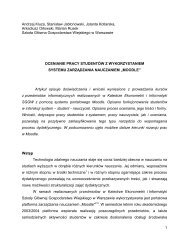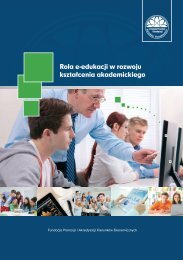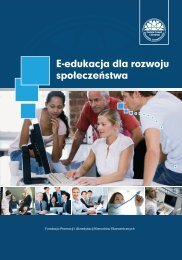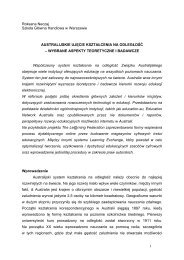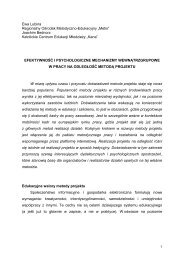Koncepcje i praktyka e-edukacji - Rozwój e-edukacji w ...
Koncepcje i praktyka e-edukacji - Rozwój e-edukacji w ...
Koncepcje i praktyka e-edukacji - Rozwój e-edukacji w ...
You also want an ePaper? Increase the reach of your titles
YUMPU automatically turns print PDFs into web optimized ePapers that Google loves.
R. Robert Gajewski, Elżbieta JarosińskaNetografiaCentrum eLearningu Uniwersytetu Ekonomicznego w Krakowie, http://cel.uek.krakow.pl/moodle/.Elearning – Program Rozwojowy Politechniki Warszawskiej, http://www.pr.pw.edu.pl/zadania-projektu/e-learning/.eLearning Framework PK, http://elf.pk.edu.pl/.IEnO: Internetowa Edukacja na Odległość, http://ieno.il.pw.edu.pl/.M. Prenski, Digital natives, digital immigrants, http://www.marcprensky.com/writing/Prensky%20-%20Digital%20Natives,%20Digital%20Immigrants%20-%20Part1.pdf.PG WILiS, Ośrodek Kształcenia na Odległość, http://okno.pg.gda.pl/.Portal Edukacyjny Lepiej, Efektywniej, http://pele.il.pw.edu.pl/moodle/.Serwis Eduk@cyjny ZBWiG PWr, http://zbw.pwr.wroc.pl/moodle/.UNIWIRT, Nauczanie przez internet, http://uniwirt.pwr.wroc.pl/.• AbstractThe period of rapid development of e-learning caused by the need of filling the education gap andgreater demographic demand is already definitely behind us. Current educational needs due to demographicdecline can be fully satisfied in the classical way. On the other hand Ministry of Higher Education ispreparing a “revolution” in higher education – from the next academic year the study outcomes should notonly reflect the scope of knowledge but also different skills that the graduates have acquired. The universitywill have to ensure also that its graduates are prepared for lifelong learning, working in teams, and will beable to communicate effectively in a group as well. According to this approach, the so-called standards ofeducation specifying the lists of obligatory courses and hours will no longer be the most important factor.These changes will hopefully encourage the teachers to become mostly the tutors, mentors or advisorsinstead of being only “providers of knowledge”. One of the conditions for achieving this goal is the existenceof adequate educational resources. The paper will present two case studies concerning various tools andstrategies for developing e-learning, which can also be used in formal and informal education.• Nota o autorachR. Robert Gajewski jest doktorem habilitowanym nauk technicznych w dziedzinie budownictwa,adiunktem oraz kierownikiem Zespołu Technologii Informacyjnych na Wydziale Inżynierii Lądowej PolitechnikiWarszawskiej. Szeroko rozumianym e-learningiem zajmuje się od ponad 15 lat. Jest autoremwielu publikacji z tej dziedziny. Jako Koordynator Projektów i Wdrożeń Informatycznych zajmuje sięefektywnym wykorzystaniem TEL w dydaktyce.Elżbieta Jarosińska jest doktorem inżynierem nauk technicznych w dziedzinie hydrologii, adiunktemoraz Wicedyrektorem ds. Dydaktyki w Instytucie Inżynierii i Gospodarki Wodnej Wydziału InżynieriiŚrodowiska Politechniki Krakowskiej. Od 2006 roku jest trenerem e-learningu, jej zainteresowania koncentrująsię wokół tematyki nowoczesnych technologii IT oraz ich wdrażania do dydaktyki.48


